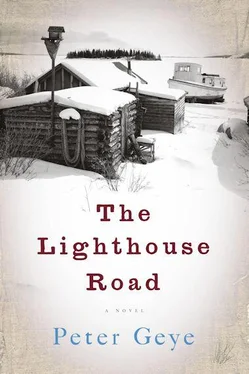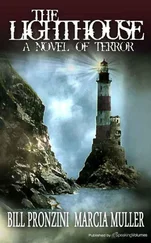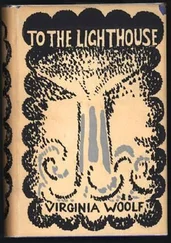"You like it?"
"A whole bunch," she said, smoothing the belly of the dress.
"It's the right size?"
She took a deep breath, stepped back. There were tears in her eyes.
"Hey, now. What are you crying for?"
She sat down, felt the dress tighten around her waist. "You're such a sweet boy."
He sat down beside her. "I got to tell you, Rebekah, you're getting harder and harder to understand. One minute you're calling me baby, the next you're calling me a boy. You're cooking up our rabbit stew, then you're sitting here crying. Do you not like the dress?"
She took another deep breath. "It won't be a month and the dress will be too small."
"Well, let's get a different size," he said, oblivious.
"It's the right size, Odd. It'll be too small because of the baby."
"That's a good reason to outgrow a dress." But he knew she was lost for the night. This was how it went: Once she settled on the pregnancy— on her fear of it, on how it would change her— she drifted off into a world of sad thoughts where he wasn't welcome. "That Glass Block store is full of a hundred dresses. We'll go find some good ones."
The apologetic smile she gave him was sincere but unmistakable. He had to look away.
Odd sat there for a long time, staring at his hands folded on his lap, thinking it was easier to read the lake than this woman. For the first time since they'd been in Duluth he felt angry with her. His reason and sympathies were being devoured by her moodiness. For all the thought he'd given it— and he was thinking of it again now— he didn't see how being here, with him, with all that was in store for them, could be worse than being in Gunflint. He got up. He wanted a drink, started for the kitchen and his stash, but stopped at the sound of her voice.
"I love you," she said. "I've loved you every way a girl can love a boy. Every way a woman can love a man."
He didn't stop walking but went into the bedroom instead of the kitchen. He took the lockbox from the bottom drawer of the armoire and the key from his pocket and unlocked the box. He moved the wads of cash aside and took the small velvet bag in his hand. He put the money back in the box and stowed it again.
He returned to the parlor. Rebekah hadn't moved. She sat on the davenport with her feet up beneath her, the cloche still on her head.
Odd knelt, took from the velvet bag the diamond ring he'd bought from the widower Veilleux, and held it before him. "I want you to marry me," he said, his voice cracking as though he were twelve years old. "I want you to be my wife and be happy with me. We can be happy."
"No," she said, as though he had proposed three hours ago and she'd had all that time to consider.
He didn't move.
She stood up, took the hat from her head, and dropped it to the floor. She reached behind her and unbuttoned the dress and let it fall and pool around her ankles. She reached behind her back and unlaced her corset, she slid her hands beneath the waist of her panties and slid her panties from her hips. They too fell in the mess of clothes on the floor.
"No," she said again. "I don't want to get married. I can't be happy and you can't be happy with me."
Odd was stunned, both by her nakedness and what she was saying.
She lay back on the davenport. " Stand up," she said. "Put that ring away."
As though Odd were hypnotized, he did as she said.
"Now, come here," she said.
When Odd stepped to her, she reached up and unbuttoned his trousers. She tugged them down and lay back again on the davenport.
"Come to me," she said.

S he left him alone in the parlor when they were finished.
He lay there for a long time before he thought to get up and pour himself that drink he'd first craved an hour earlier. On the way back to the sitting room he stopped and found a new pack of cigarettes in his coat pocket. He also found Sargent's gift. He took both to the window and lit a cigarette and took a sip of his whiskey. He looked at the pack age. He looked at Rebekah's dress and hat and undergarments still piled on the floor.
He felt aged, like ten years had passed since he'd got home from work, like in all that time the world had changed without his knowing. He drank and smoked and looked out on the Christmas Eve. There was the snow.
He looked over his shoulder, thought of her sleeping— how could she sleep ? — back on their bed.
Almost as though he were surprised, he felt Sargent's gift in his hand. And because he could think of nothing else to do, he tore off the paper. It was a Bible. There was a note, too, written in Sargent's impeccable script: turn to luke. bless you. h. sargent
Odd opened the book and scanned the names— he might have been reading roll for the old men in Gunflint: Joshua, Samuel, Isaiah, Jeremiah, Daniel, Hosea— until he found Luke and turned to the corresponding page. At first he was put off by the high style of the King James version. It reminded him of those Greek poets he'd been made to read in school what seemed like a hundred years ago. But as he settled into it he found himself in a kind of communion with the gospel.
And so he read the story of the life of Christ. He read for hours, until the first light of Christmas morning was showing on the edge of the dark sky. When finally he put the book down and laid his head back, he realized that his own sorrow and suffering were nothing next to the world's. If Rebekah would renounce him, if she would renounce her child, he would be father enough when the time came to raise his baby.
He set the Bible on the floor, stood up and gathered Rebekah's new dress and undergarments from the floor, folded them neatly, and put everything in the department-store box.

I n an examination room on Ellis Island, an immigration official asked Thea her final destination.
"Gunflint, Minnesota," she said.
The Norwegian-speaking immigration officer checked one of a dozen ledgers on his desk. "Gunflint, you say?" He checked another of the ledgers. " There doesn't seem to be a place with that name."
Thea was of course confused. She told him her aunt and uncle lived there. She gave him their names as though that might prove its place on a map, its place in a ledger.
"How will you be getting from here to there?" he said.
She told him she would be taking a train from Hoboken to Chicago. From Chicago she'd take a steamer to Duluth. From Duluth another steamer up Lake Superior to Gunflint. She told him her uncle raised cattle.
The immigration officer consulted an atlas of Midwestern states. He summoned another official and, after a brief consultation, they settled on Duluth, Minnesota, for Thea's final official destination.
Five hours later she was on a barge bound for Hoboken. She would not remember these days, or would remember them only as a blur, as though she had passed through the train station in Hoboken in a dream. The locomotive was another dream, and the two days it spent on its way to Chicago were still other dreamlike days.
In Chicago, at Union Station, she stepped from the train into the strangest world yet, a building so grand and in such contrast to anything she had ever imagined that it frightened her. All that noise and motion and clamor like a taut string about to snap.
And outside Union Station was another kind of tension, another kind of dream. The buildings above her were shrouded in fog, a kind of rain fell and drenched the penny map she held before her. On Michigan Avenue she walked north to the river and found the docks of the Chicago, Soo & Duluth Line. In the ticket office she bought a third-class berth on the Sault for seven dollars. She had only four hours to wait for her three-day cruise to Duluth.
Читать дальше














